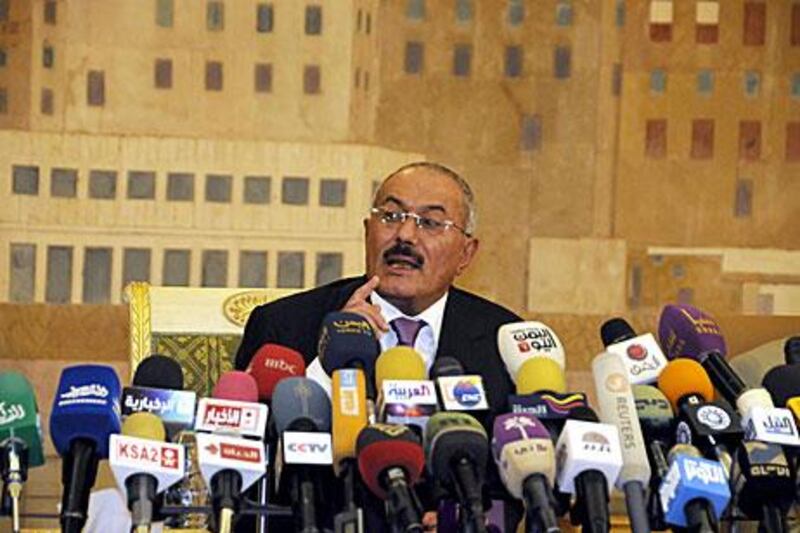WASHINGTON // Ali Abdullah Saleh, Yemen's president, is not unfamiliar with throwing a curveball. Throughout his 33 years in power, he has done so a number of times in attempts to try to unite and hold together his fractious country.
Now he has done it again with his request to receive medical treatment in New York.
The request certainly seems to have taken the US administration - still officially considering it - by surprise, and has put it in a quandary: either the US rejects a long-time and much-lauded ally in the American war on Al Qaeda, or the administration risks being seen as sheltering a leader held responsible for killing hundreds of demonstrators.
So adept at muddying the waters is Mr Saleh that it is not clear if he is even seeking medical attention.
At a press conference in Sanaa on Saturday he denied it, saying his health was fine.
"I will go to the United States, not for treatment, because I'm fine, but to get away from attention, cameras, and allow the unity government to prepare properly for elections," he said. "I want to be away for the elections, because whether it fails or succeeds, people may blame the president."
That only made the situation more difficult for the US, as US officials have said they would grant Mr Saleh permission to enter the country for the sole purpose of seeking medical treatment.
One important component in the US calculation would be to what extent granting Mr Saleh permission for what may in effect turn out to be asylum could help or hinder a transition of power in Yemen. Here too, however, the picture is anything but clear. Saleh loyalists and relatives continue to play significant roles in the Yemeni regime.
Should the US conclude that taking in Mr Saleh would somehow ease a transition, as Mr Saleh seemed to hint at, the Obama administration would still want to be sure that he didn't use sanctuary in the US as a way to influence events back home.
Moreover, the administration would then have to consider how it would respond to any uproar in Yemen, where the immunity granted Mr Saleh under the Gulf Cooperation Council agreement that saw him step from power has proven deeply controversial.
Edmund Hull, a former US ambassador to Yemen, told Al Jazeera on Tuesday that the US would have to decide whether the "possibility of a short-term gain" was worth the "distinct probability" of a long-term problem.
For now, the administration has kicked the problem down the road. The State Department said Mr Saleh's request would have to go through the normal process and "only at the end of this internal review process will a final visa adjudication be made".
But, of course, the request is anything but normal, something the US media has been quick to point out.
In 1979, the administration of Jimmy Carter granted the exiled shah of Iran permission to enter the US for medical treatment. The decision worsened relations with Iran, then in the throes of revolution.
When Iranian students later stormed the US embassy in Tehran, Mr Carter's refusal to send the shah back to Iran for trial led to 52 Americans being held hostage for 444 days.
Ronald Reagan used the hostage situation in easily defeating Mr Carter's bid for reelection in 1980.
With an election year looming, Barack Obama, the US president, will be keen to avoid a similar situation. Yet he will also have to balance that against rumbling discontent among some on the foreign policy circuit in Washington that his administration has been too hasty in casting aside old allies in favour of the uncertainty of the Arab Spring.
Ultimately, the administration may have to fall back on a Yemen policy shaped almost entirely by counter-terrorism priorities. Mr Obama may have been granted a Nobel Peace Prize in the early stages of his presidency, but policy on Yemen - as on Iraq and Afghanistan - has been characterised by a willingness to continue and even expand policies of the previous administration of George W Bush.
Notably, Mr Obama's administration has expanded the practice of unmanned drone strikes in Yemen and Pakistan, of dubious status under international law. Mr Obama ordered the killing of Anwar Al Awlaki in Yemen, a US citizen on foreign soil, prompting sharp criticism from American human-rights groups.
Such logic would dictate that any decision about allowing Mr Saleh into the country would be determined by the significance the administration attaches to Mr Saleh's past support for the US fight against Al Qaeda in Yemen.
Other factors are the role to be played by those loyalists and relatives who will remain in Yemen in significant positions and how it may affect future US freedom of action in a country that, without Mr Saleh, may not be quite as amenable to US drone attacks on its soil.
[ okarmi@thenational.ae ]





